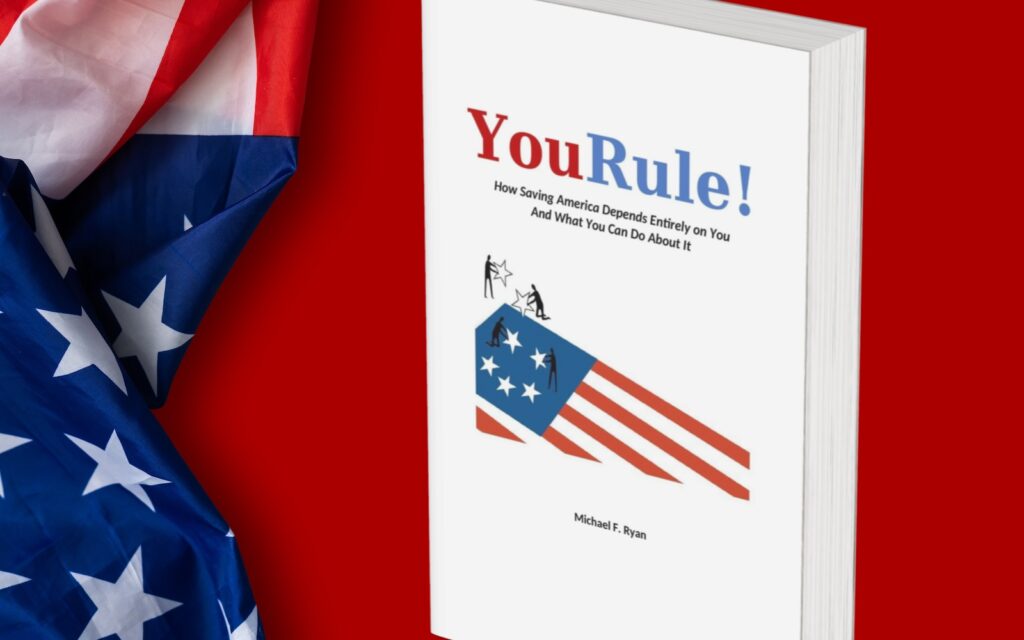YouRule!: The ‘Five Cs’ of civic construction, and how they can rebuild America
(Editor’s note: This is the 7th of 10 articles serializing Executive Editor Michael Ryan’s ebook YouRule: How Saving America Depends Entirely on You And What You Can Do About It.)
Before…

(Editor’s note: This is the 7th of 10 articles serializing Executive Editor Michael Ryan’s ebook YouRule: How Saving America Depends Entirely on You And What You Can Do About It.)
Before setting to work on fixing our civic infrastructure, let’s first get a handle on those tools, the Five Cs of civic construction.
Civics
A formal definition of civics is “the study of the rights and duties of citizens.” But for the working man and woman—someone whose second job entails running the most powerful country on Earth—civics means so much more.
It means, as stated earlier, being knowledgeable about our system of government. There’s a telling scene in the 1993 movie Dave, in which an ordinary person who looks like the president is groomed as a substitute when the real president falls ill. A reporter assures the nation that the president “continues to be briefed on all areas of national concern.” In reality, and with some comic effect, his handlers have set up an oversized chart in the Oval Office and are schooling the fake president on the three branches of government.
This nation can’t afford for its citizens to be that ignorant.
Civics also is about being informed about the world around us, past and present. That means being up on the news and the newsmakers. It means being able to pick the Speaker of the House out of a photo lineup, and being versed enough in basic U.S. history to tell an interviewer on the street which country we gained independence from. You’d be agog at how many of us can’t!
At bottom, civics is simply a system we’ve devised to govern how we interact in a self-governed arena. It’s the rules of engagement for a free people.
Citizenship
In a free country, citizenship is infinitely more than official membership in a particular nation or a humorless face on a passport. Citizenship is applied civics. It’s everything that civics is—just put into action. In fact, citizenship ought to be a verb, as in, “Bye honey, I’m going out to do a little citizenshipping tonight.”
Of course, citizenship is everything you do in interacting with the government, most notably paying taxes and registering and then voting. But it’s also anything you do as part of your public life, such as helping strangers and the less fortunate, volunteering in your community or in someone else’s, tending your garden and otherwise being a good neighbor, following the law and more.
Interestingly, becoming as self-reliant as possible is, itself, a considerable act of citizenship: It’s largely the most self-reliant who are helping others in times of disaster and need, such as the skilled boatman or amateur carpenter headed to the aftermath of a hurricane, or that amazing guy down the street who can somehow slap a snowplow on his pickup to help out his neighbors.
The best picture of citizenship I’ve ever seen was drawn for me by a newly naturalized American.
I’ve been privileged to speak at several naturalization ceremonies, and at one I presented a goofy list of the Top 10 things that make America great—such as tennis players whose names you can actually spell, or news media that take an active interest in a politician’s love life. But when I asked the group of new citizens what they really thought made America great, one woman instantly cried out, “The opportunity to serve.”
That woman gets America. And luckily, America got her.
Civility
The most unselfish person I’ve ever known once told me, paradoxically, that his No. 1 concern is his own health. Without it, he explained, nothing else happens, especially his good works. Made perfect sense to me.
Similarly, if we can’t be civil to each other, nothing good comes of any of this. How can we solve our problems and realize our potential together if we can’t communicate with each other?
It stands to reason, then, that incivility is America’s first challenge, and quite possibly a national security threat. You may not see it in your private life; all your interactions may be cordial, courteous, even warm and loving. But you see it in your public life. It’s all around you, on our dog-eat-dog roadways and in our politics, our media and especially our anti-social media. Boorishness and bullying have become the coin of the realm for many of the poorly bred among us. And it’s contagious.
Incivility is nearly a reflex, a selfish, shortsighted, instant reply to frustration or offense. It’s the toddler’s way; we seem to have been instinctually programmed to boil at low temperatures. In contrast, civility, patience, calm reflection—even love—takes maturity, thought, effort and practice.
The cost of incivility to the body politic—in just issues unresolved and potential candidates resolved not to take the abuse of running for office—is incalculable. But at least one company put a price tag on incivility at the office: Cisco once estimated that incivility, even in an “exemplary workplace,” cost the company $12 million a year. Disgruntled current employees do more damage to a company than the stereotypical former employee.
And if the bill for incivility in the private sector is likely in the billions, surely it’s in the trillions in public life. Just look at how inefficient and wasteful our ever-bickering Congress is.
We’ve got to stop assuming the absolute worst in each other and expressing it recklessly. We’ve got to get ahold of ourselves instead of each other’s throats. It’s in our best interests, and in the national interest as well. Kindness is a fundamental act of citizenship.
Constitution
What if McDonald’s had decided, halfway through its titanic growth, to junk its business plan and just wing it? You’d have to be nuts to throw a highly successful plan out with the day’s trash. Yet there’s a school of thought in America that our Constitution is archaic, outdated and irrelevant today.
Talk about rubbish! Are logic, wisdom, scholarship and insight into human nature—the essentials that our Constitution is informed by—so very different today? Are we so much wiser and righteous that we no longer need the protections and proscriptions from the whims of man contained in this most perceptive and enduring of social contracts?
The Constitution is our business plan. It’s what made America what it is—which, as you already know, is truly exceptional.
It is so because of the Constitution’s elegant simplicity; its historical recognition that no one can be trusted with unchecked power (thus, three co-equal branches of government and the separation of their powers); and, most of all, its acknowledgment that you are born with certain “inalienable” rights (as the Declaration of Independence puts it)—that you, the individual, are sovereign, and that the government is subject to you rather than the other way around.
You’ve gotta love Americans! No people on Earth walk around with a larger chip on their shoulders about what the government can and cannot do to them. But remember: That chip is made out of fine quality 1780s-era parchment. You like the idea that you rule? Well, it’s the Constitution that spells that out.
James Madison captured the brilliance of the Constitution as well as anyone ever when he wrote that, “In Europe, charters of liberty have been granted by power. America has set the example … of charters of power granted by liberty.”
I realize the Founders aren’t all that in fashion these days, having been understandably reassessed for abiding, and even taking part in, the horrid bondage of their fellow human beings. I wish it were otherwise; slavery and segregation and discrimination are oozing wounds in the country’s soul. But we only hurt ourselves, not the long-dead, if we casually, even righteously, dismiss the Founders or the genius they handed down.
Early-1800s statesman Daniel Webster said of the Constitution, “I regard it as the work of the purest patriots and wisest statesmen that ever existed, aided by the smiles of a benign Providence; it almost appears a Divine interposition in our behalf. … (T)he hand that destroys our Constitution rends our Union asunder forever.”
Character
The dictionary definition of character covers both people and things: “the aggregate of features and traits that form the individual nature of some person or thing.” When it comes to describing people, though, I’d make it read “the aggregate of features, traits and actions that form the individual nature of some person.”
Your character, in short, is the clearest possible snapshot of you—because it’s indicative of your thoughts, beliefs, morals, ethics and even future actions. It’s the MRI of your psyche that every prospective employer—or spouse or lover, for that matter—would love to get ahold of. There may be no better prognostic instrument.
Character is an umbrella term for all the best traits, such as honesty, integrity, humility, discipline, compassion, selflessness, diligence and more. The Boy Scouts and U.S. Army are two of the societal institutions leading the way in teaching character—but they pale in importance compared to church, school and family.
Nowhere is character more important than in a nation of free individuals who are basically on the honor system. In fact, Benjamin Franklin cautioned that, “Only a virtuous people are capable of freedom. As nations become corrupt and vicious, they have more need of masters.”
Character is the particle inside the atom within the molecule that makes up the building blocks of a free country. And when you look at some of the character traits common today—the selfishness, shortsightedness, dishonor, disrespect and disregard—it does not bode well for the future of the republic.
At bottom, America desperately needs a renaissance of morality and responsibility. And if we all just sharpen these five tools of civic construction, we’ll go a long way toward rebuilding our civic infrastructure.
Next: What could possibly be worse than 9/11? Well, this …
Previous:
(1) ‘How Saving America Depends Entirely on You And What You Can Do About It’
(2) YouRule!: Saving America requires bringing back civics – but making it as exciting as it really is
(3) YouRule!: American exceptionalism, the secret sauce to saving the country
(4) YouRule!: Saving America requires this historic juggling act
(5) YouRule!: How did America get to this point, and whom can we blame?
(6) YouRule!: How our ‘civic infrastructure’ is broken, and how we can we fix it
About the Author

Michael F. Ryan is executive editor of The Lion, as well as a longtime newspaper journalist and editorial writer, frequent speaker, and author of the international novel The Last Freedom on Holocaust survivor Viktor Frankl.
His award-winning work has appeared in newspapers and magazines since the 1980s, as he has made a decades-long study of civic engagement and its decline.
The full YouRule! ebook is available for 99 cents at either BookBaby or Amazon.

